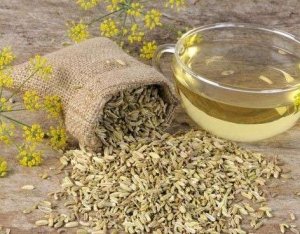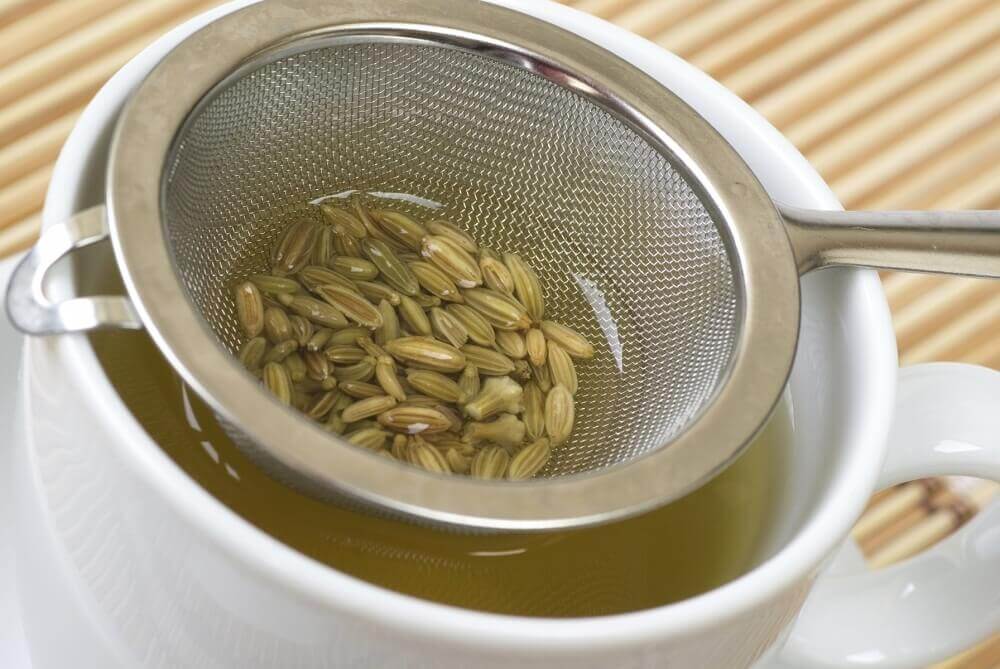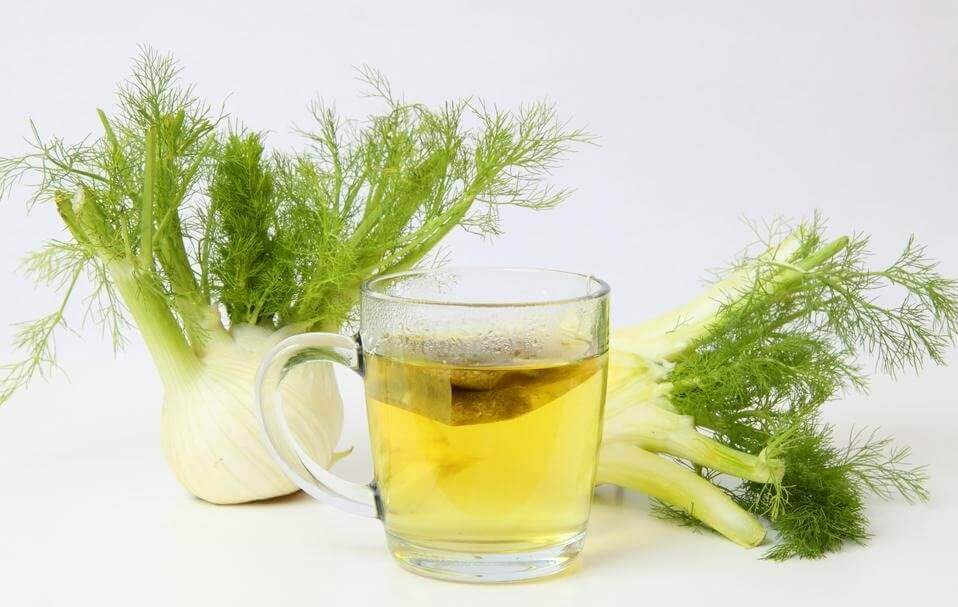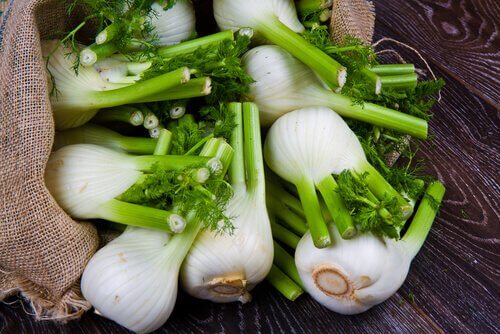Three Beneficial Fennel Infusions to Lose Weight


Written and verified by the pedagogue in physical education and nutritionist Elisa Morales Lupayante
This plant has been considered a traditional remedy to treat a wide variety of conditions. Among them, fennel has been used as an aid to lose weight, as a digestive and to reduce gas.
By helping to digest and assimilate nutrients more efficiently, fennel tea can fit into a comprehensive weight loss plan. That’s why in this article we’d like to share these three beneficial fennel infusions.
The characteristics of fennel
Native to the Mediterranean region, fennel is an aromatic plant with feathery leaves and yellow flowers. It grows almost anywhere and has been used for centuries for culinary purposes but also as a medicinal herb.
Both the bulb and the small seeds have a very prominent aroma and flavor, which reminds many of licorice and anise. Both parts can be used as usual, along with the stems and leaves.
At a general level, multiple properties and applications of fennel seeds are known. Traditionally, it has also been used to improve many ailments, although sometimes these actions have not been supported by scientific data. Some of these include:
- It contains numerous volatile compounds, some of which have antioxidant and anti-inflammatory capacity.
- It’s an anti-infective agent, which makes it ideal for problems of bacterial, fungal, and viral origin. Thanks to this, it can be effective in treating abdominal pain, diarrhea, fever, gastritis, mouth ulcers, respiratory disorders, or skin infections.
- It improves bad breath.
- It’s a liver protector.
- Fennel has estrogenic properties.
Properties of fennel to lose weight
Of all the actions that fennel has on the body, some may be positive when weight loss plans are followed. It’s not a plant with slimming properties. However, it could be taken as an adjuvant.
On the one hand, its effect as an appetite suppressant is known, due to the presence of anethole. This is interesting when following a slimming diet as it could help reduce intake and increase the feeling of satiety and satisfaction after meals.
In a study with healthy women, it was observed that drinking 250 milliliters of fennel tea before eating helped them feel less hungry and consume fewer calories during the meal.
Also, thanks to its antispasmodic properties, this plant can help relax the digestive tract and relieve cramps and gas. In this way, it’s possible to feel more deflated and avoid problems derived from a higher intake of fiber (which is usually advisable to help lose weight).
Likewise, the fact of drinking liquids (either water or infusions) favors urination and the elimination of liquids.
Lastly, as the study in the Revista Biomedical Research (cited above) points out, fennel has a positive action against stress and anxiety. Controlling these two aspects can also be very useful during the weight loss process, to better cope with changing habits and avoid compulsive eating.
In view of all these data, it might be advisable to include fennel as one more component of a diet to lose weight. And an easy way to do it is through these three infusions.
1. Fennel seed tea to lose weight

Fennel seed infusion is one of the most common ways to take advantage of the benefits of this plant to lose weight. Consuming it helps to prolong the feeling of satiety and also improves digestion.
Ingredients
- 1 tablespoon of fennel seeds (10 g)
- 1 cup of water (250 ml)
Preparation
- Crush the fennel seeds using a mortar and pestle to release the flavor and oils, as well as the aroma.
- Place the crushed seeds in a tea ball or colander and pour a cup of boiling water over them.
- Allow the seeds to steep for seven to 10 minutes.
- Remove the seeds and add a little more hot water.
Visit this article: Peppermint Oil Against Irritable Bowel Syndrome
2. Fennel tea with fresh leaves

All parts of fennel can be used for edible and therapeutic purposes. So if you have fresh leaves you can also prepare an infusion. In addition, these can be included in broths and soups.
Ingredients
- 1 cup of water (250 ml)
- 1 cup of fresh fennel leaves (60 g)
Preparation
- Cut the fresh green leaves from the stem of the plant and rinse them well.
- Place them in a cup or container.
- Pour the boiling water over the leaves.
- Let it steep for 15 to 20 minutes.
- Remove the leaves and add a little more hot water.
3. Fennel bulb tea
 Ingredients
Ingredients
- 2 fresh fennel bulbs (500 g)
- 3 cups of water (750 ml)
Preparation
- Wash and clean the bulbs thoroughly.
- Put the water in a pot and boil for about 15 or 20 minutes.
- Strain and reserve the liquid. When it’s warm, you can drink it as a broth or infusion.
- Set aside the cooked bulb to mix with other vegetables or to make a soup or puree.
What else to keep in mind about fennel infusions
Fennel is considered a safe plant by the US Food and Drug Administration. Therefore, it can be said that its consumption is safe for the general population when consumed in doses considered food.
On the other hand, precautions should be taken when considering taking more concentrated preparations such as the essential oil, extracts, or tablets of the plant.
Likewise, the consumption of these infusions is not recommended during pregnancy. In the case of lactation, fennel is even recommended to calm colic in babies and improve milk production. However, it’s advisable to consult with the doctor before taking it.
All people undergoing pharmacological treatments or who suffer from chronic illnesses or conditions should also consult a health professional. Although it seems that there are no serious interactions and contraindications, it’s always better to know the convenience of including these infusions in the daily routine.
In reference to adverse reactions, it could cause problems for people with allergies to carrots or celery. In this sense, it’s important to remember that fennel comes from that same family.
You must take into account symptoms such as itching, hives, or swelling of the skin. If this happens, you should stop drinking this tea and consult with your doctor.
Introduce fennel infusions in your routines to lose weight
Have you already tried these fennel infusions to lose weight? As you can see, they’re very easy to prepare and have important benefits for the body.
Keep in mind that fennel may have some properties that help people who want to lose weight. However, the scientific evidence to support this activity is scarce and many studies have been carried out with fennel extracts (more powerful than infusions).
It should also be noted that when it comes to losing weight, the best thing is to go to a nutritionist or dietitian who prepares an adequate and personalized diet. Also, you should accompany it with a series of healthy lifestyle habits, which are essential for this goal.
All cited sources were thoroughly reviewed by our team to ensure their quality, reliability, currency, and validity. The bibliography of this article was considered reliable and of academic or scientific accuracy.
- Badgujar S, Patel V. V, et al. Foenicum vulgare Mill: a review of its botany, phytochemistry, pharmacology, contemporary application and toxicology. BioMed Research International. Agosto 2014. 842674.
- Bae J. Y, Kim J, et al. Fennel (Foenicum vulgare) and Fenugreek (Trigonella frenum-graecum) tea drinking surpasses subjective short-term appetite in overweight women. Clinical Nutrition Research. Julio 2015. 4 (3): 168-174.
- Drugs and Lactation Database (Lactmed) [Internet]. National Library of Medicine (US): 2006. Fennel. [Uppdated 2022 March 21.].
- Ghazanfarpour M, Mohammadzadeh F, Shokrollahi P, Khadivzadeh T, Najaf Najafi M, Hajirezaee H, Afiat M. Effect of Foeniculum vulgare (fennel) on symptoms of depression and anxiety in postmenopausal women: a double-blind randomised controlled trial. J Obstet Gynaecol. 2018 Jan;38(1):121-126.
- Nejatbakhsh R, Riyahi S, Farrokhi A, Rostamkhani S, Mahmazi S, Yazdinezhad A, Kazemi M, Shokri S. Ameliorating effects of fennel and cumin extracts on sperm quality and spermatogenic cells apoptosis by inducing weight loss and reducing leptin concentration in diet-induced obese rats. Andrologia. 2017 Oct;49(8).
- Portincasa P, Bonfrate L, Scribano ML, Kohn A, Caporaso N, Festi D, Campanale MC, Di Rienzo T, Guarino M, Taddia M, Fogli MV, Grimaldi M, Gasbarrini A. Curcumin and Fennel Essential Oil Improve Symptoms and Quality of Life in Patients with Irritable Bowel Syndrome. J Gastrointestin Liver Dis. 2016 Jun;25(2):151-7.
- U. S. Food and Drug Administration. Code of Federal Regulations title 21. U. S. Department of Health and Human Services. Marzo 2022.
This text is provided for informational purposes only and does not replace consultation with a professional. If in doubt, consult your specialist.








